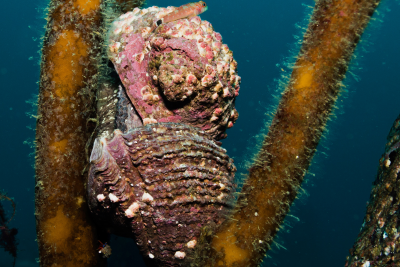News
The Chilean Abalone is "International Mollusc of the Year 2023" - Its genome is completely sequenced by the LOEWE Center TBG

The Chilean Abalone (Concholepas concholepas) has been voted "International Mollusc of the Year 2023," beating four other mollusc species as finalists in the international competition. With about 42 percent of the votes, it passed another sea snail, a deep-sea oyster and two nudibranch species. All interested parties were able to vote online for their mollusc favorite from March 1 to March 19.
Concholepas concholepas belongs to the Murex snails and is found in the southeastern Pacific Ocean. The carnivorous animal can grow up to 15 centimeters and takes the role of a keystone species, as it controls the occurrence of other species. Known as "Loco" (a loanword of the Mapuche people in Chile) in its native country, the snail with the large foot and resistant shell has great cultural, social, economic, evolutionary and ecological importance. But its populations are endangered due to severe overfishing. The so-called "Chilean abalone", which externally resembles the sea snail abalone, is traded worldwide as a delicacy. Polluted coastal areas also threaten the species.
The animal was nominated for the title “International Mollusc of the Year 2023” by Associate Professor Antonio Baeza. He conducts research on biodiversity, evolution, and conservation of marine organisms at the Department of Biological Sciences at Clemson University in South Carolina, USA. As the winning species of the competition, the marine snail will receive a complete sequencing of its genome by the LOEWE Centre TBG. “With the Chilean Abalone, a mollusc was selected that is interesting to study in several respects. On the one hand, the species has to adapt to adverse conditions such as exploitation and marine pollution. In addition, however, a component of its blood, the oxygen transporter haemocyanin, also shows an immunotherapeutic effect against some types of cancer,” explains jury member Dr. Carola Greve, lab manager at the LOEWE TBG Centre. “So, the genomic analysis can not only help to explore adaptation strategies and different populations in the large distribution area, but also to discover new molecules with pharmaceutical importance.”
Nominations for the “International Mollusc of the Year 2024” are already open now: https://tbg.senckenberg.de/mollusc-of-the-year-nominations/

